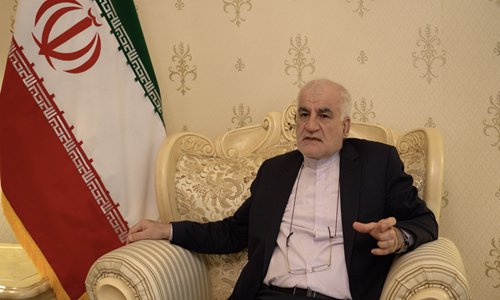There will be no war between Iran, US: Iranian ambassador to China
By Li Aixin Source:Global Times Published: 2019/6/26 20:06:55

Photo: Yu Tianjiao/GT
I think there won't be a war between Iran and the US, said the Iranian ambassador to China Wednesday during an exclusive interview with Global Times, stressing that Washington is well aware that Tehran will not flinch in the face of US pressure, "therefore, the US dares not strike us."
Mohammad Keshavarzzadeh, who was appointed ambassador of Iran to China last year, said "Iran is not interested in war with the US, but if a war is launched by the US side, Tehran will retaliate."
US President Donald Trump said he called off a strike against Iran with 10 minutes to spare after he was told 150 people could be killed. According to Keshavarzzadeh, the excuse is nonsense because the US has already caused quite a few casualties in not only Iran, but the entire Middle East.
While saying that Washington does not actually care about casualties in the region, the ambassador noted the US stopped the mission because it will lead to retaliatory actions from the Iranian side. "If a war breaks out, the US will also suffer long-term shocks, so it will not start a fight," Keshavarzzadeh said, adding that the primary goal of the US is to reinforce economic pressure on Iran.
On Monday, Washington imposed fresh sanctions on Iran, "stepping up a policy of pressuring the nation's leaders and further squeezing the Iranian economy," reported the New York Times. "It shows the US cannot be trusted," said Keshavarzzadeh.
Before the new sanctions, the US side claimed over the weekend that Washington was prepared to negotiate with Iran without preconditions. Keshavarzzadeh said, however, that potential negotiations with no preconditions attached do not exist. "The US withdrawal from the Iran nuclear deal, strict economic sanctions against Iran and increasing US military presence in the Persian Gulf all show that Washington has many preconditions over talks with Iran," he added.
"The US withdrawl from Joint Comprehensive Plan of Action destroys any negotiation chance. US coming back to nuclear deal can pave the way for probable negotiation," Keshavarzzadeh told the Global Times.
RELATED ARTICLES: